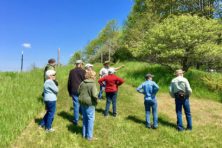State News: Vinehout for Governor, Voter ID Law, Organic Farming
- Share
- Tweet
- Pin
- Share
Vinehout ‘All In’ Against Walker
Democratic state Sen. Kathleen Vinehout, D-Alma, said she’s all in when it comes to beating Gov. Scott Walker in next year’s election.
Vinehout won’t run for a fourth Senate term and may get into farming full-time at her family’s farm if she doesn’t take the governor’s office.
Vinehout won a tight race for the 31st Senate seat in 2006 and has been there ever since. On Monday, she entered a crowded field of Democrats hoping to unseat Walker next November.
Vinehout said her campaign platform is about turning the state’s priorities “upside down,” and returning power and funding to local governments, which she argues has the most impact in the lives of citizens.
She said the $3 billion incentives package Walker and state Republican leadership offered to Taiwanese manufacturer Foxconn is an example of money that could have been better spent investing in local communities. Vinehout points to public-private partnerships such as Eau Claire’s Confluence Performing Arts Center as better ways for state dollars to spur growth in cities across the state.
This is Vinehout’s second run for governor. In the 2012 recall of Walker she lost a primary to fellow Democrat Mary Burke.
Vinehout said if she can’t beat Walker next year, she’ll take a break from the state Legislature.
“I’m thinking I’m going to be growing the grassroots around the state, or I’m going to be growing some kind of crops on my farm. Both of which, are fun to do,” Vinehout said.
UW Study: Voter ID Law Kept Thousands from Voting
A study from the University of Wisconsin-Madison estimates that up to 23,000 people in Dane and Milwaukee counties did not vote in November 2016 because of the state’s voter ID law. The survey was mailed to 2,400 registered voters living in the two counties and who did not vote. Of those, 293 people returned questionnaires as part of the survey. Only seven percent said they believed they did not have the types of identification necessary under the law, and did not vote as a result. Many respondents said they did not vote for reasons unrelated to the voter ID law. Dane County Clerk Scott McDonell funded the study with county property taxes. McDonell is a Democratic opponent of the law. African-Americans and low-income people were affected the most, according to the study. Milwaukee County Clerk George Christenson said he’s “furious to see that Jim Crow laws are alive and well.” The governor’s office says the ID law has protected the “integrity of the voting process.”
Former GOP Lawmaker Appointed To Elections Commission

Former state Rep. Dean Knudson was appointed by Assembly Speaker Robin Vos, R-Rochester, on Monday to serve on the six-member state Elections Commission.
Knudson was instrumental in the creation of the Elections Commission. While in the Assembly, he sponsored the bill that ended the nonpartisan Government Accountability Board and replaced it with two bipartisan commissions, the Elections Commission and Ethics Commission.
The legislation was fueled in part by Republicans’ anger over the GAB’s role in the John Doe investigation of Gov. Scott Walker’s recall campaign.
Knudson was in the Assembly from 2011 to 2017 and is replacing Steve King, who resigned in August after President Donald Trump appointed him U.S. Ambassador to the Czech Republic.
The Elections Commission is scheduled to meet this week to discuss a Trump administration request for information on voter fraud.
Wisconsin No. 2 in Organic Farming
Wisconsin remains No. 2 in the nation for the number of organic farms, despite increasing competition from other states.
A new report from the U.S. Department of Agriculture shows the number of organic farms in Wisconsin increased by six percent between 2015 and 2016, with 1,276 operations reported last year.
“I think six percent growth is fairly good,” said John Mesko, executive director of the Midwest Organic and Sustainable Education Services. “I don’t know of another segment of the ag community that’s growing at that rate.”
But just last year New York state saw a 13 percent jump in organic farms – bringing their total up to 1,059 operations. It was the first time a state other than Wisconsin and top-ranked California reported having more than 1,000 organic farms.
Former Congressman Green Leads USAID

Former Wisconsin 8th District Congressman Mark Green took lead of USAID – the U.S. Agency for International Development – in August, and has since grappled with a series of natural disasters.
His agency has workers on the island of St. Maarten in the Caribbean due to damage from Hurricane Irma earlier this month and in Mexico City after a 7.1 magnitude earthquake hit last week.
While disasters have plagued Green’s short tenure as head of USAID, disaster response and relief is only part of the organization’s mission.
After being sworn in, Green – a Republican who represented Wisconsin’s 8th Congressional District from 1999 to 2006 –traveled to Africa, visiting both North and South Sudan. During that trip Green, who also served as ambassador to Tanzania after his stint in Congress, called the country a “very troubled land.”
Despite tensions in places like South Sudan, Green said Africa is home to seven of the world’s 12 fastest growing economies. Besides humanitarian and disaster assistance, USAID has a mission to relieve extreme poverty. Green said trade is one way to accomplish that.
“In terms of trading partners and markets for Wisconsin goods, if we can help those countries rise, if we can help them take on their own challenges so they can become closer trading partners and consumers of goods, that’s good for us back home,” Green said.
Wisconsin Public Radio, © Copyright 2017, Board of Regents of the University of Wisconsin System and Wisconsin Educational Communications Board.

